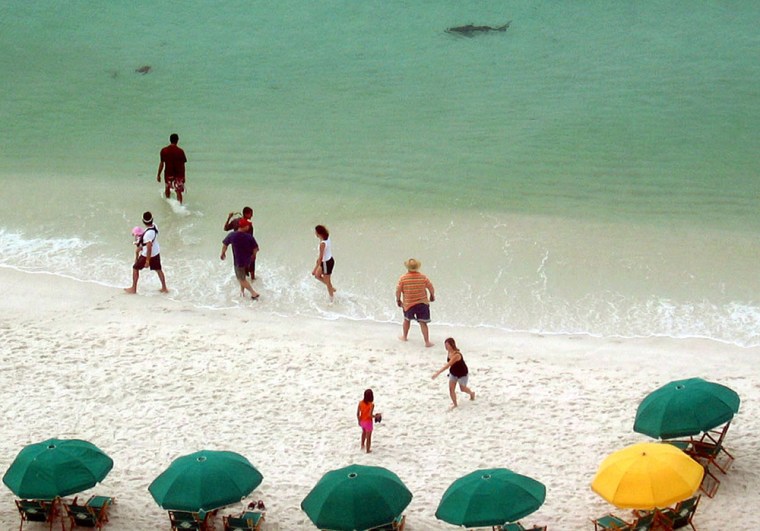Shark attacks increase in the summer when the large predators swim closer to shore and tourists flock to the water, so two attacks in three days off popular beaches in the Florida Panhandle are not unusual, according to a trio of shark scholars.
On Saturday, 14-year-old Jamie Marie Daigle of Gonzales, La., died when a shark mutilated her leg at a beach near Destin.
On Monday, Craig Adam Hutto, 16, of Lebanon, Tenn., was attacked while fishing in waist-deep water off Cape San Blas, 80 miles to the east and about the same distance southwest of Tallahassee. His right leg was later amputated and he was in critical condition.
George Burgess, curator of the International Shark Attack File at the University of Florida in Gainesville, said there are no previously recorded shark attacks off either Destin or Cape San Blas, going back to 1882.
But "there is no way to make a call on a trend based on two attacks," said Burgess. He said that judging from the wound, Saturday's attack was by a bull shark that was 7 to 8 feet long.
Burgess said bull sharks are common in the Gulf, are aggressive and can be found in shallow water.
'Sharky time of year'
John Tyminski, a senior biologist with the Center for Shark Research at Mote Marine Laboratory in Sarasota, agreed that sharks looking for food come closer to shore in the summer months, coinciding with people heading to the beach.
"It's a sharky time of year," said Tyminski.
Samuel Gruber, a professor of marine and atmospheric science at the University of Miami, said it is easy to hypothesize and guess why the attacks happen, but there is no way to prove or disprove such theories.
"Shark attacks are in the realm of unpredictable phenomena. You can make up all kinds of fanciful hypotheses about why something happens ... It's just educated guesswork," Gruber said.
Sometimes clusters of attacks show up in areas where there were none previously, he said.
Don't blame the sharks
"I do not believe the sharks up in Destin have decided to start attacking people," Gruber said. "When there is a greater number of people in the water with a greater number of sharks ... you will get more collisions."
According to one theory, last year's Hurricane Ivan shifted sandbars along the coast of the northern Gulf of Mexico, allowing sharks to swim closer to shore.
"I know of no scientific evidence to support that," Burgess said.
Experts also note that Florida averaged more than 30 shark attacks a year from 2000 to 2003, but only 12 were reported last year. And Saturday's fatal attack was the first in Florida since 2001.
The odds of being attacked by a shark in Florida waters are one in 11.5 million, according to statistics for 2000.
Chances of dying from lightning are much higher. Since 1959, Florida has seen 425 lightning fatalities, compared to eight shark attack fatalities.
Some tips
While the risks are low, experts at the Florida Museum of Natural History do have tips to reduce that even further:
- Always stay in groups since sharks are more likely to attack a solitary individual.
- Avoid being in the water during darkness or twilight hours when sharks are most active and have a competitive sensory advantage.
- Do not enter the water if bleeding from an open wound or if menstruating as a shark’s olfactory ability is acute.
- Wearing shiny jewelry is discouraged because the reflected light resembles the sheen of fish scales.
- Avoid waters with known effluents or sewage and those being used by sport or commercial fisherman.
- Use extra caution when waters are murky and avoid uneven tanning and bright colored clothing, sharks see contrast particularly well.
- Refrain from excess splashing and do not allow pets in the water because of their erratic movements.
- Do not enter the water if sharks are known to be present and evacuate the water if sharks are seen while there.
